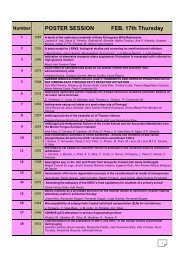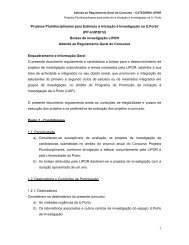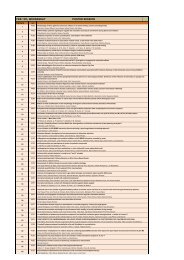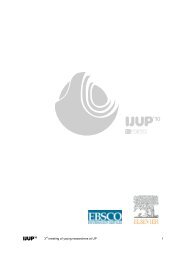IJUP08 - Universidade do Porto
IJUP08 - Universidade do Porto
IJUP08 - Universidade do Porto
- TAGS
- universidade
- porto
- ijup.up.pt
You also want an ePaper? Increase the reach of your titles
YUMPU automatically turns print PDFs into web optimized ePapers that Google loves.
The relativity of happiness: Portugal and the EU<br />
J.P. Fique 1 , D.A. Sá 2<br />
1Undergraduate student, Faculty of Economics, University of <strong>Porto</strong>, Portugal.<br />
2Undergraduate student, Faculty of Economics, University of <strong>Porto</strong>, Portugal.<br />
“Life is a progress from want to want, not from enjoyment to enjoyment”<br />
Samuel Johnson, 1776<br />
What makes us happy? This everlasting question gained recently a good amount of<br />
attention from Economics. Until this unexpected focus from Economics, psychologists<br />
have been studying this matter, which became a valuable support for economic analysis of<br />
happiness.<br />
In the present analysis it will be considered the relation between happiness and income.<br />
The reference in this relation is the work developed by Richard A. Easterlin (1974, updated<br />
in 1995), the so called Easterlin Para<strong>do</strong>x consists in the “para<strong>do</strong>x of substantial real income<br />
growth in Western countries over the last fifty years, but without any corresponding rise in<br />
reported happiness levels” (Clark, A.E., Frijters, P., Shields, M.A, 2006) [1] . But, a second<br />
literature has emerged pointing that money <strong>do</strong>es matter. The result of the reconcilement of<br />
Easterlin Para<strong>do</strong>x and this second literature is that happiness is relative, it depends on both<br />
external and internal reference points.<br />
Extending this theoretical result, we can consider as Kapteyn et al (1976) as previously<br />
argued, that reference groups include whole countries. We propose to question if the low<br />
rank of Portugal in terms of Life Satisfaction is a result of considering the European Union<br />
as a reference group. Hence, the low Life Satisfaction results would be a consequence of<br />
the difference between Portugal’s income and the supposed reference group.<br />
To <strong>do</strong> so, we will use data available from Eurobarometer. In terms of theoretical<br />
orientation, it will follow the perspective of “Clark, A.E., Frijters, P., Shields, M.A,<br />
2006” [1] in close propinquity.<br />
This analysis the proposition of the application of a theoretical perspective to the<br />
understanding of happiness, which will be used in our ongoing research project “Happiness<br />
and the Human Development Index: The case of Lisbon and <strong>Porto</strong>”. Therefore, it will aim<br />
to favor a discussion about this topic and not present actual results. What we propose to <strong>do</strong><br />
is identify in the Eurobarometer data results predicted by this line of thought.<br />
References:<br />
[1] Clark, A.E., Frijters, P., Shields, M.A. (2006), Income and happiness: Evidence, explanations<br />
and economic implications, Paris-Jourdan Sciences Economiques, WP nº 2006-24.<br />
[2] Easterlin, R.A. (2001), Income and happiness: towards a unified theory, in The Economic<br />
Journal, 111 (July), 465-484. © Royal Economic Society 2001. Published by Blackwell Publishers,<br />
108 Cowley Road, Oxford OX4 IJF, UK and 350 Main Street, Malden, MA 02148, USA<br />
91










